Valerius Cordus
Valerius Cordus (18 February 1515 – 25 September 1544) was a German physician and botanist who authored one of the greatest pharmacopoeias and one of the most celebrated herbals in history. He is also widely credited with developing a method for synthesizing ether (which he called by the poetic Latin name oleum dulci vitrioli, or "sweet oil of vitriol").
Valerius Cordus | |
|---|---|
 | |
| Born | 18 February 1515 |
| Died | 25 September 1544 (aged 29) |
Cordus wrote prolifically, and identified and described several new plant species and varieties. The plant genus Cordia is named for him.
Life
In 1515, Valerius Cordus was born either in the city of Erfurt in Thuringia, or somewhere in the westwardly adjacent state of Hesse. His father, Euricius Cordus (born Heinrich Ritze, 1486–1535), was an educated physician and an ardent Lutheran convert.
Valerius began his higher education in 1527, at the young age of 12, studying botany and pharmacy under the tutelage of his father. In the same year he also enrolled at the University of Marburg. He completed his bachelor's degree in 1531, whereupon he furthered his studies by enrolling in the University of Leipzig, and by working at an apothecary shop in Leipzig owned by his uncle (either Johannes or Joachim).
In 1539 he relocated to Wittenberg in order to lecture and study medicine at the University of Wittenberg. His lectures proved popular, and Cordus' lecture notes were published posthumously in 1549 as Annotations on Dioscorides. Among the research outlined in the lectures were the results of his own systematic observations of many of the same plants described by Pedanius Dioscorides in the 1st century CE. Direct observation of live specimens was one of Cordus' strengths.
In 1540 Cordus discovered and described a revolutionary technique for synthesizing ether, which involved adding sulfuric acid to ethyl alcohol.
In 1542 he began travelling back and forth between Germany and Italy for his research and studies, and also presented his great pharmacopoeia, Dispensatorium, to the Nuremberg city council. The council presented him with 100 gold guilders following the presentation, and published the work posthumously as a single volume in 1546.[1]
The University of Wittenberg awarded him a medical degree in 1544, the same year that his great herbal in five volumes, Historia Plantarum, was published—a work unique at the time for its balanced analysis of interest not only to botanists, but to pharmacists and herbalists as well.
Later that same year, Cordus, his friend Hieronymus Schreiber[2] and two French naturalists traversed Italy in the height of summer. Cordus ventured into a marsh in search of novel plants. Soon after, he exhibited the symptoms of malaria. Schreiber and party brought the feverish Cordus to Rome before embarking on a trip to Naples. Cordus, aged 29, died in their absence. When the band returned, they scarcely managed to prevent the body of Cordus, a Protestant, from being thrown into the Tiber River. He was interred at Santa Maria dell'Anima, the German Catholic church in central Rome.
Legacy
Throughout his short life, Cordus travelled extensively, visited many universities, and was widely acclaimed by his colleagues and other associates. He was an impressive linguist, and also spoke eloquently on philosophy. As a botanist, he observed with a breadth and depth that surpassed most of his contemporaries; as a scientist, his methodology was systematic and thorough.
After the death of Cordus, Conrad Gessner published a considerable amount of Cordus' remaining unpublished work, including De Extractione (which featured Cordus' ether synthesis method), Historia Stirpium and Sylva in 1561.
Notes
- Sprague, T. A. (1939). "The Herbal of Valerius Cordus". The Journal of the Linnean Society of London. Linnean Society of London. LII (341).
- Robertson Arber, Agnes (1912). "The Herbal in Germany". Herbals, Their Origin and Evolution: A chapter in the history of botany, 1470–1670. Cambridge: Cambridge University Press. p. 66. OCLC 45889011. Retrieved 1 January 2013.
References
- Theodor Husemann (1876), "Cordus, Valerius", Allgemeine Deutsche Biographie (ADB) (in German), 4, Leipzig: Duncker & Humblot, pp. 479–480
- Valerius Cordus at the Galileo Project
- Valerius Cordus de Oberhessen at Só Biografias (in Portuguese)
- Groll, E. K. (Hrsg.): Biografien der Entomologen der Welt : Datenbank. Version 4.15 : Senckenberg Deutsches Entomologisches Institut, 2010 (in German)
- Isely, Duane (2002). One Hundred and One Botanists. West Lafayette, Indiana: Purdue University Press. pp. 29–31. ISBN 978-1-55753-283-1. OCLC 947193619.
External links
 Media related to Valerius Cordus at Wikimedia Commons
Media related to Valerius Cordus at Wikimedia Commons
